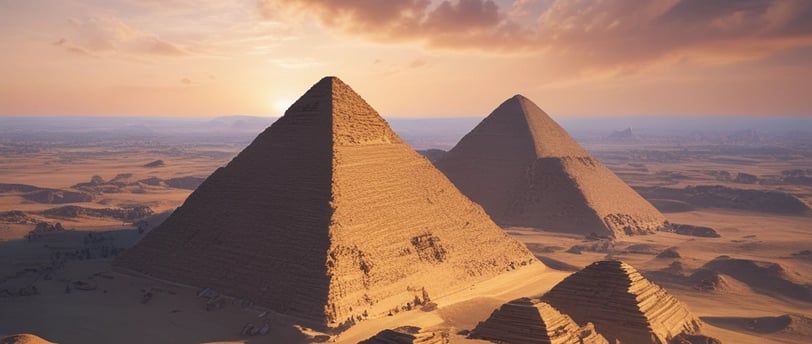Ancient Civilizations
Explore the enigmatic wonders of ancient civilizations, from the precise construction of the Great Pyramid of Giza to the advanced engineering of the Antikythera Mechanism. It examines theories of lost technologies, extraterrestrial influences, and forgotten brilliance, challenging traditional historical narratives and inspiring a deeper curiosity about humanity’s hidden potential and enduring legacy.
Steve Ryan
12/30/20242 min read


What if the story of human civilization isn’t as straightforward as we think? Consider the Great Pyramid of Giza—an ancient marvel built with such precision that its mysteries continue to baffle scientists, historians, and dreamers alike. One of its lesser-known features, the eight-sided design, can only be observed under specific light conditions. Pair this with the once-glimmering smooth limestone casing and you have a monument that seems almost otherworldly. Could ancient humans alone have achieved such feats? Or are we missing something?
This question pushes us to reconsider the boundaries of our understanding. Ancient structures like the pyramids, the Piri Reis map, and even the Baghdad batteries suggest a depth of knowledge far beyond what conventional history teaches. These relics are not just stone, parchment, or clay—they are whispers of a forgotten brilliance. The pyramids, for instance, are aligned so precisely with celestial bodies that they seem to embody a cosmic knowledge we struggle to replicate today.
The Antikythera Mechanism, a 2,000-year-old analog computer discovered in a shipwreck, provides another jarring example. With its intricate gears and precise calculations, this device could predict astronomical events with uncanny accuracy. Its discovery raises a compelling question: How many other inventions, perhaps even more advanced, have we lost to time?
Some theories propose that extraterrestrial beings or advanced ancient civilizations, such as the Anunnaki, played a role in these achievements. While mainstream science often dismisses these ideas, they capture our imaginations and encourage us to challenge the limits of what we accept as fact. Could it be that visitors from another world shared knowledge that spurred humanity forward, or might there have been Earth-based civilizations with capabilities rivaling our own?
The possibility of lost civilizations forces us to confront another uncomfortable truth: survival isn’t guaranteed. Just as the Antikythera Mechanism lay dormant under the sea for centuries, our own achievements could someday vanish without a trace. The pyramids, with their timeless endurance, might outlive even our most advanced technologies. If future beings or civilizations were to stumble upon a fragment of our world, what would they make of it?
Perhaps the deeper lesson in exploring these mysteries is not whether aliens built the pyramids or whether the Anunnaki shared their secrets. Instead, it is about embracing curiosity and humility. By questioning accepted narratives and considering alternative perspectives, we allow ourselves to imagine a richer, more complex history of humanity. In doing so, we may even find insights into our own potential.
Want to explore more about ancient mysteries and how they challenge our understanding of history? Check out our latest podcast episode where we dive deeper into these ideas and share personal stories of discovery and curiosity.
